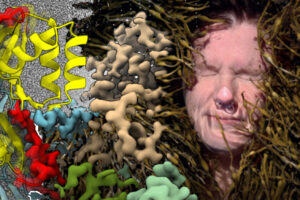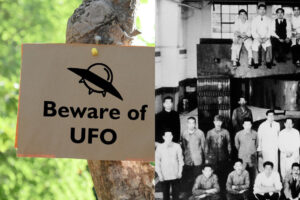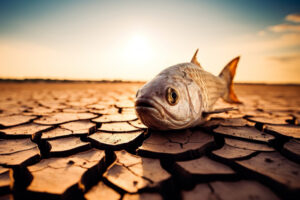Upcoming dinner salon / workshops in 2026
February 12 / March 12 / April 9 / May 7 / June 11
What we do in a writing workshop
How we give feedback, and why we do it
All past workshops
What enters us, what changes us
Our first text this month pondered the state of science communication about the environment, through an unusual form of personal reflection on plastic particles that enter us and cloak themselves…
Parenting on planet health-science hellscape
Parental anxiety around the health of our children was at the forefront of this month’s workshop. This meeting was one of the most packed ones so far, and the quality…
Tracing the scale of the unseen: from trans-species atmospheres to minuscule molecules
This workshop had us look at the world from its two extremes: the macroscopic domain of the invisible yet tangible ethical relationships that entangle researchers with their subjects of study,…
What does “knowledge” depend on?
Beware of UFO In the consciousness of a scientifically-minded person, UFOs might seem like just another quirky, conspiratorial, psycho-social delusion to be analyzed from the safety of academic objectivity, and…
Who defines disease, and who gets money to study cures?
At our August meeting we workshopped two draft opinion essays that, from different angles but from within the same field, raised fundamental questions about how we should describe and nurture…
Unconventional science lessons in health
Embracing uncertainty This tends to be an unconventional public stance for scientists these days, which could be why our first draft text this month felt so fresh when it began…
Ethical dilemmas of genetic testing, and the history behind them
Imagine you are in a hospital lobby bustling with parents and noisy children, and then you take the elevator way up to a quiet prenatal diagnostics center, where no children…
The hypoxia of the sea & the silent hitman
The sensation of being unable to breathe had both literal and symbolic resonance in our texts this month. Of the two texts-in-progress we workshopped, one was an evocative memory of…
Bringing opinion essays into being / The Chronic Migraine Chronicles
To welcome spring we kicked off an opinion-essay writing drive, then workshopped sections from a forthcoming memoir-and-science-guide for general readers about living with chronic migraines. Benefits of opinion-essay writing Opinion…
Can extremophiles save the cat? Using “story grid”
Telling science stories can take the basic form of a “why / how / what” presentation, or the more ambitious form of a “story grid“, like the kind that bestselling…
Scientific genius—or not?
How do we as a society figure out if scientific genius is the real thing? What role should science writers play in celebrating or critiquing apparent scientific brilliance? What happens…
Bioracism reborn?
Many science bloggers and writers put their thoughts into the form of essays that discuss a new book, or several new books where the writer sees a theme. We studied…
The intersection of science and literature
We had a special treat at our dinner salon and workshop meeting this month: Iida Turpeinen, one of Finland’s leading thinkers and practitioners in the transdisciplinary space between science and…
The bioethics of the brain-machine interface
Direct electrical/digital interfaces between human brains and machines are advancing rapidly while AI is suddenly infiltrating the process of human thinking at mass scale. Where are we headed? At our…
What are zoos? Do we live in one?
Does visiting a zoo ever give you a strange feeling-not just about our relationship with nature, but maybe even about your own life? What kind of science and ideas lie…
Rethinking the secret life of plants
With the long-awaited greenery of the Nordic summer finally upon us, it was the perfect time to consider the secret life of plants. They’re not what we think they are:…
Fact vs. fantasy—science writing meets science fiction
For communicating factual science, we’ve talked about using techniques from fiction. And we’ve workshopped fiction that’s intended to communicate about factual science. But is there a difference, actually, between writing…
Sex, fads, and math
Scientists might use a term like “computed statistics of social synchrony” to refer to what normal people might call sex, fads, and math. Our two texts this month brought us…
Would you want to live longer but get younger?
We had a fun challenge this month from Hanna Västinsalo, our celebrity filmmaker, who leverages her PhD in genetics to entertain audiences with unexpected science stories with a human perspective.…
Using ourselves as characters to guide audiences into science
Lecturing at an audience and just “explaining the science” isn’t always the most effective way to communicate. An alternative approach that’s often recommended is using a personal story to connect…
What explains public distrust of science?
A concern frequently voiced by participants in our workshops is the decline of public trust in science. The need to rebuild trust, and strengthen public awareness of the scientific process,…
Going deep—getting the writer and reader immersed
What happens when, as we research and write, we take a really deep dive-especially into subject matter that might be outside our expertise, or into a complicated real-world situation, or…
Reaching resistant readers
How do you get your message to the audience that needs to hear it-especially if they are likely to resist? For that matter, as writers, how do we learn enough…
The entanglement of subject and object
Sir Isaac Newton thought light consisted of particles, until Thomas Young’s famous “double-slit experiment”, believed to have been performed in 1801, suggested that light actually took the form of waves.…
The shocking truth about scientific utopias
Scientists hate science. Or so it seemed when we read the judges’ comments and the winning stories in the EU-LIFE/Nature essay competition, which had been intended to encourage scientists to…
Using dramatic stories to teach
How to get readers interested in the nuances of complex debates over climate policy? Yawn. Unless, maybe, you start your story like this: A typhoon has hit Manila during a…
Writing for kids makes us better science writers for adults
One of the senior scientists in our workshop group recently found himself in the impromptu situation of sitting down for a video interview about his complex research on mitochondrial diseases-but…
Medically and genetically engineered dystopias
Science fiction is an especially creative kind of science writing, one that can show us the present in imaginative and emotionally charged ways while also anticipating possible futures. Amidst hopeful…
Should scientists express opinions? If so, how?
Among the top 100 most-influential scientists on Twitter-according to an early and somewhat controversial survey by Science way back in 2014-was Trish Greenhalgh (pictured). Today Greenhalgh is at Oxford, where…






























